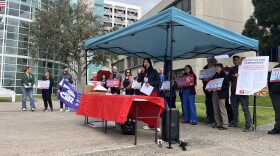RENEE MONTAGNE, host:
Now to the Middle East. One of Egypt's most important sources of national income is fees that ships pay when they pass through the Suez Canal, the famous waterway connecting the Mediterranean and the Red Sea. Those fees are shrinking, in part thanks to Somali pirates, whose attacks in the Gulf of Aden have prompted some companies to reroute their ships. But even worse than pirates: the global economic downturn. From Cairo, NPR's Peter Kenyon reports.
PETER KENYON: The Suez Canal has always been a larger-than-life symbol in Egypt, first of colonial domination under the French and then the British, and later a self-determination when Nassar declared Egyptian control of the canal in 1956.
Unidentified Man: A new Middle East crisis arises as President Nasser of Egypt tells a wildly cheering crowd in Alexandria that Egypt has seized the internationally owned Suez Canal. Britain freezes all Egyptian funds, and Egypt retaliates with the same measures. France lodges a bitter protest and suggests military action.
KENYON: All of Egypt's top three sources of revenue were down these days: tourism, remittances from foreign workers, and fees from ships transiting the Suez Canal. Canal revenues plunged more than 20 percent in the first quarter of 2009 over the same period last year. Late last year, amid a flurry of pirate attacks in the Gulf of Aden, some shipping firms announced they would send vessels around the southern tip of Africa rather than risk the journey up the Red Sea and through the canal to the Mediterranean.
But economists say the piracy impact is minor compared with more basic economic realities. Demand for everything from oil to consumer goods has plunged, so fewer ships are moving, and canal revenues are slumping as a result. Besides providing direct revenue, the Suez Canal is an important source of foreign currency. So economists are seeing increased downward pressure on the Egyptian pound. Any devaluation of the pound, in turn, means higher prices for imports, and Egypt imports a number of stable products. So a weak pound is bad news for Egyptians, and for a government that spends a good deal of money each year subsidizing basic necessities.
Officials say Egypt is responding with new incentives to reduce the cost of shipping through the canal. The Suez Canal authority decided earlier this year not to increase fees, and discounts previously available only to the most frequent users of the canal are being extended to other shippers as well. Egypt is hoping the incentives stem the loss of revenue until the economy turns around.
Peter Kenyon, NPR News, Cairo. Transcript provided by NPR, Copyright NPR.






